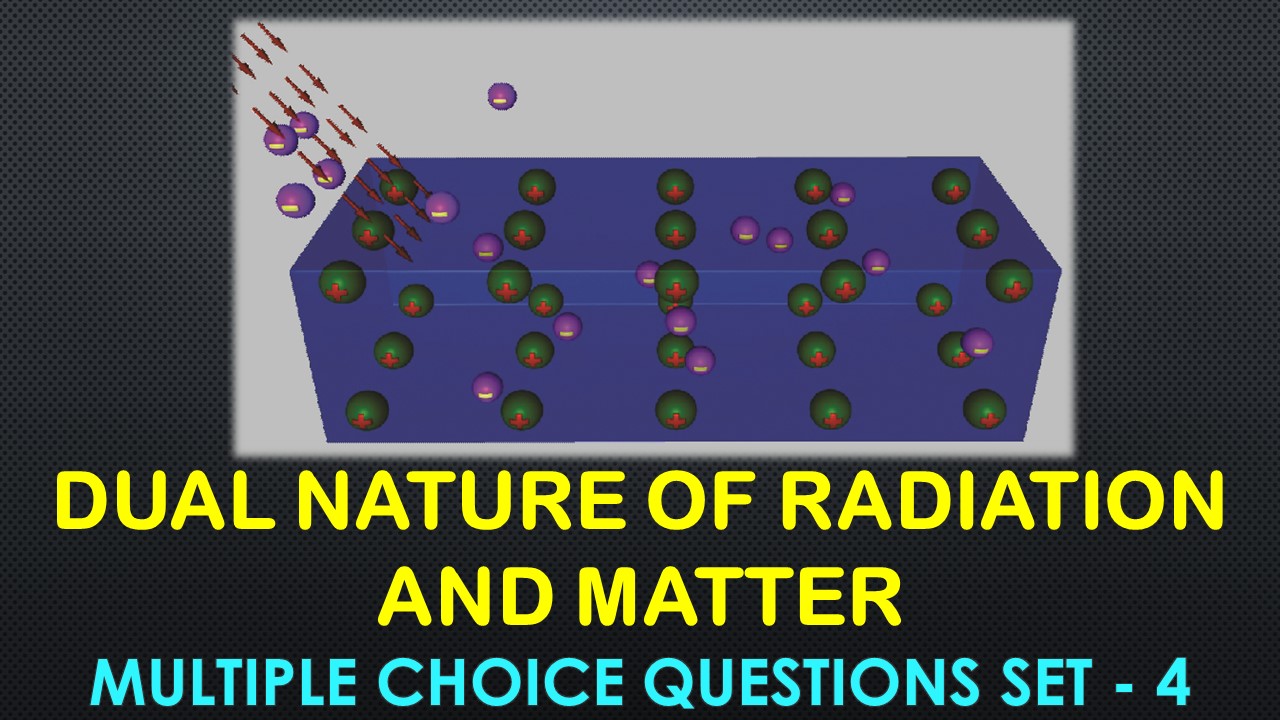CBSE Class 12 Dual Nature of Radiation and Matter Multiple Choice Questions with Answers. MCQ Questions Class 12 Dual Nature of Radiation and Matter with Answers Is Prepared Based on Latest Exam Pattern. Students can solve NCERT Class 12 Dual Nature of Radiation and Matter MCQs with Answers to know their preparation level.
Students who are searching for NCERT MCQ Questions for Class 12 Dual Nature of Radiation and Matter with Answers are compiled here to get good practice on all fundamentals. Know your preparation level on MCQ Questions for Class 12 Dual Nature of Radiation and Matter with Answers. You can also verify your answers from our provided MCQ Class 12 Dual Nature of Radiation and Matter with Answers. So, ace up your preparation with MCQ of Class 12 Physics Examinations.
MCQ Questions Class 12 Dual Nature of Radiation and Matter with Answers - Set - 4
Question 1:
Which one of the following is not dependent on the intensity of incident photon in a photoelectric experiment ?
(a) work function of the surface
(b) kinetic energy of photo-electron
(c) stopping potential
(d) amount of photo-electric current
Correct Answer – (B)
Question 2 :
When an electron jumps across a potential difference of 1 V, it gains energy equal to :
(a) 1.602 × 10-19 J
(b) 1.602 × 1019 J
(c) 1.602 × 1024 J
(d) 1 J
Correct Answer – (A)
Question 3 :
Compared to liquids and solids, gases are:
(a) good conductors of electricity
(b) best conductors of electricity
(c) very poor conductors of electricity
(d) good or bad conductors of electricity depending upon the nature of the gas
Correct Answer – (C)
Question 4 :
Which Characteristic of a target does the Mosley’s law relate the frequency of X-rays?
(a) density
(b) atomic number
(c) atomic weight
(d) interatomic space
Correct Answer – (B)
Question 5 :
The de-Broglie wavelength of particle of mass 1 mg moving with a velocity of 1 ms-1, in terms of Planck’s constant h, is given by (in metre):
(a) 105 h
(b) 106 h
(c) 10-3 h
(d) 103 h
Correct Answer – (B)
MCQ Questions Class 12 Dual Nature of Radiation and Matter with Answers
Question 6 :
X-ray will not show the phenomenon of :
(a) interference
(b) deflection by electric field
(c) diffraction
(d) superposition
Correct Answer – (B)
Question 7 :
The different stages of discharge in a discharge tube can be explained on the basis of:
(a) the wave nature of light
(b) the dual nature of light
(c) wave nature of electrons
(d) the collision between the charged particles emitted from the cathode the atoms of the gas in the tube
Correct Answer – (D)
Question 8 :
The charge of a photo electron is :
(a) 9.1 × 10-31 C
(b) 9.1 × 10-27 C
(c) 9.1 × 10-24 C
(d) none of these
Correct Answer – (D)
Question 9 :
Evidence of the wave nature of light cannot be obtained from:
(a) diffraction
(b) interference
(c) doppler effect
(d) reflection
Correct Answer – (D)
Question 10 :
When a yellow light is incident on a surface, no electrons are emitted while green light can emit electrons. If the red light is incident on the surface then:
(a) no electrons are emitted
(b) photons are emitted
(c) electrons of higher energy are emitted
(d) electrons of lower energy are emitted
Correct Answer – (A)
- NCERT Solutions Class 11 Chemistry Chapter 1 : Some Basic Concepts of Chemistry
- NCERT Solutions Class 11 Chemistry Chapter 2 : Structure Of The Atom
- NCERT Solutions Class 11 Chemistry Chapter 3 : Classification of Elements and Periodicity in Properties
- NCERT Solutions Class 11 Chemistry Chapter 4 : Chemical Bonding and Molecular Structure
- NCERT Solutions Class 11 Chemistry Chapter 5 : States of Matter
- NCERT Solutions Class 11 Chemistry Chapter 6 : Thermodynamics
- NCERT Solutions Class 11 Chemistry Chapter 7 : Equilibrium
- NCERT Solutions Class 11 Chemistry Chapter 8 : Redox Reactions
- NCERT Solutions Class 11 Chemistry Chapter 9 : Hydrogen
- NCERT Solutions Class 11 Chemistry Chapter 10 : The s-Block Elements
- NCERT Solutions Class 11 Chemistry Chapter 11 : The p-Block Elements
- NCERT Solutions Class 11 Chemistry Chapter 12 : Organic Chemistry: Some Basic Principles and Techniques
- NCERT Solutions Class 11 Chemistry Chapter 13 : Hydrocarbons
- NCERT Solutions Class 11 Chemistry Chapter 14 : Environmental Chemistry




